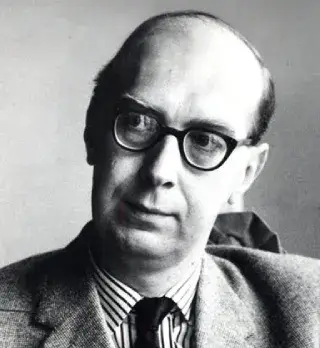Biography of Philip Larkin

| date | place | |
|---|---|---|
| born | August 09, 1922 | Coventry |
| died | December 02, 1985 | Kingston upon Hull |
Philip Larkin stands as one of the preeminent figures in post-war English poetry, renowned for his distinctive blend of skepticism, understated wit, and a penetrating insight into the human condition. His works reflect a characteristic blend of the ordinary and the profound, turning everyday observations into profound reflections on life, death, love, and the passage of time. Born in Coventry, England, to Sydney Larkin and his wife Eva Emily Day, Philip was influenced from an early age by his father's political views and literary interests. Sydney Larkin's enthusiasm for Nazism, though largely philosophical rather than active, cast a shadow over Philip's early life, contributing to the complex, often contradictory character of the poet himself. Larkin's education at King Henry VIII School in Coventry was followed by his attendance at St. John's College, Oxford, where he studied English literature and forged friendships that would significantly shape his literary career. After graduating from Oxford, Philip Larkin embarked on a career as a librarian, a profession that would provide him with the stability and solitude necessary for his writing. His professional journey took him from Wellington to University College Leicester, and subsequently to positions in Belfast and Hull. In Hull, he served as the librarian at the University of Hull's Brynmor Jones Library, a role he held until his death. This period was marked by significant literary productivity and recognition. Larkin's poetic oeuvre, though not extensive, is highly regarded for its technical mastery, thematic depth, and emotional resonance. His major poems collections include "The North Ship" (1945), which showcases the influence of W.B. Yeats; "The Less Deceived" (1955), which marked his emergence as a major voice in English poetry; "The Whitsun Weddings" (1964), celebrated for its depiction of post-war British society; and "High Windows" (1974), which explores themes of mortality and human frailty. Larkin's poetry is characterized by its accessible language, precision of imagery, and a pervasive sense of nostalgia and disenchantment. In addition to his poetry, Larkin was a skilled novelist, though he published only two novels, "Jill" (1946) and "A Girl in Winter" (1947), before deciding that fiction was not his forte. He was also an accomplished jazz critic and photographer, pursuits that reflected his wide-ranging interests and talents. Larkin's personal life and views became subjects of controversy following the posthumous publication of his letters and a biography by Andrew Motion. The revelation of his racist, sexist, and generally misanthropic remarks in private correspondence has led to a reevaluation of his work and legacy. Despite this, Larkin's contributions to English literature have been widely recognized; he was offered the position of Poet Laureate in 1984, which he declined, preferring to focus on his writing and maintain his privacy. Larkin died of cancer in 1985, leaving behind a body of work that continues to be celebrated for its ability to articulate the complexities of human life with both stark realism and profound empathy. His influence on contemporary poetry and his status as one of the leading poets of the 20th century remain undisputed, even as debates about his personal beliefs and their impact on his legacy continue. Philip Larkin's poetry stands as a testament to the power of language to distill the essence of human experience into poignant, often haunting verse. Renowned for his keen observations of the mundane aspects of English life, Larkin captured the rhythms and nuances of everyday existence with a rare clarity and precision. His poems often explore themes of isolation, disillusionment, and the passage of time, reflecting a deep-seated skepticism towards societal norms and human relationships. Yet, amidst the bleakness of his subject matter, there exists a profound sense of empathy and compassion, as Larkin delves into the universal struggles of love, loss, and mortality. Central to Larkin's poetic vision is his masterful use of language and form, characterized by its simplicity, elegance, and understated beauty. His poems are marked by their meticulous attention to detail, with each word carefully chosen to evoke vivid imagery and evoke complex emotions. From the hauntingly evocative "Church Going" to the wistful nostalgia of "MCMXIV" and the poignant reflections on aging in "High Windows," Larkin's body of work encompasses a rich tapestry of human experience. Through his exploration of the ordinary and the extraordinary, Larkin invites readers to confront the fundamental truths of existence, leaving an indelible mark on the landscape of modern poetry.
Feel free to be first to leave comment.